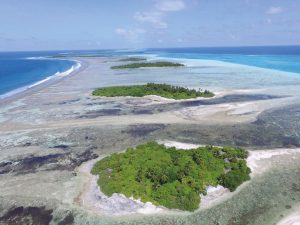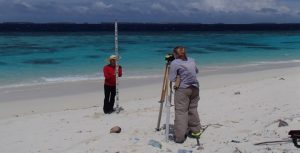31 October 2018
Not all coral reef islands may disappear with rising seas
Posted by Sandra Ortellado
By Sandra Ortellado
Rising sea levels associated with climate change may not drown all coral reef islands, according to new research.
A new study analyzing past reef island formation in the Indian Ocean finds higher-than-present sea levels and large waves were critical to coral island initiation in the past and increases in these conditions could result in reef islands growing vertically. This suggests not all coral reef islands will respond to climate change in a uniform way and some islands may in fact grow as sea levels rise, according to the researchers.
The new study, published in Geophysical Research Letters, a journal of the American Geophysical Union, found reef islands in the Maldives, an island nation in the Indian Ocean encompassing 26 coral atolls, formed at different times with varying responses to past climate change. The new results contrast previous research suggesting coral reef islands will drown as sea levels rise
The findings are important for reef island populations as they develop policies in response to climate change, according to Holly East, lead author of the study and a lecturer in physical geography at Northumbria University in Newcastle upon Tyne, United Kingdom.
“Uniform assumptions about the future of reef islands under sea-level rise may be inappropriate without considering the diversity of reef islands and how they may respond differently to climate change,” East said.
Although the findings suggest coral reef islands may not necessarily disappear with rising sea levels, they are still vulnerable to the effects of climate change, according to the study authors. The islands are formed mostly of coral, and only a healthy coral reef can provide the materials for island building. Corals face a range of threats under climate change, including increasing sea surface temperatures and ocean acidity. If the reef is unhealthy, there will be no building materials despite perfect island building conditions.
“Conserving coral reefs is therefore critical for ensuring future reef island resilience,” East said.
Island evolution: past, present, and future
In the new study, researchers collected cores of sediment from Huvadhoo Atoll rim in the Maldives.
Then, they radiocarbon dated the sediments from different depths in the cores to find out how old the
islands are and when different phases of island building occurred. The team used the data to reconstruct the island’s evolution and identify key phases of island building over the past approximately 4,500 years.
The researchers found clear variations in the timing, sediment composition, and modes of reef island development within regions in the Maldives, showing reef islands can form at different stages of sea-level rise, fall and stabilization.
Nevertheless, island building occurred on a time scale of thousands of years. Though higher sea levels and larger waves may result in reef island building over time, current island populations must still respond to the short-term consequences of sea-level rise in their communities, like flood events, East said.
The large waves that may drive vertical island building could also devastate existing island infrastructure. A challenge for reef island nations may be to develop infrastructure that can withstand or adapt to large wave events.
Rising sea levels may build, rather than destroy, coral reef islands from Northumbria University on Vimeo.
—Sandra Ortellado is a science writer intern at AGU













 GeoSpace is a blog on Earth and space science, managed by AGU’s Public Information staff. The blog features posts by AGU writers and guest contributors on all sorts of relevant science topics, but with a focus on new research and geo and space sciences-related stories that are currently in the news.
GeoSpace is a blog on Earth and space science, managed by AGU’s Public Information staff. The blog features posts by AGU writers and guest contributors on all sorts of relevant science topics, but with a focus on new research and geo and space sciences-related stories that are currently in the news.